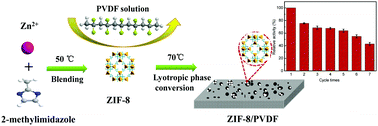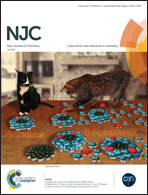Immobilization of cellulase proteins on zeolitic imidazolate framework (ZIF-8)/polyvinylidene fluoride hybrid membranes†
Abstract
Enzyme immobilization with its finely preserved activity has attracted tremendous attention in the fields of biochemistry, biosensors and biomedicine. In this work, zeolitic imidazolate framework (ZIF-8) incorporated polyvinylidene fluoride (PVDF) hybrid membranes (denoted as ZIF-8/PVDF hybrid membranes) have been successfully fabricated through a simple mechanical blending method with controllable loading amounts of ZIF-8 composites. The morphologies, phases, and constituents of the ZIF-8/PVDF hybrid membranes are characterized using field emission scanning electron microscopy (FESEM), X-ray diffraction (XRD), Fourier-transform infrared (FT-IR) spectroscopy and thermal gravimetric analysis (TGA), respectively. The hydrophobic/hydrophilic nature of these hybrid membranes is also investigated through measuring their surface water contact angle. The cellulase immobilization tests demonstrate that the equilibrium adsorption capacities of cellulase on the as-prepared ZIF-8/PVDF hybrid membranes are greatly improved in comparison to that on the pristine PVDF membranes. Importantly, compared with free cellulase, the immobilized enzymes retain their activity and meanwhile their stability is significantly improved against different pH values, temperature and storage durations. Furthermore, the immobilized cellulase can be used in cyclic catalytic reactions, and the relative activity maintains 42.8% of its original activity after 7 cycles, indicating the great potential applications of the as-fabricated ZIF-8/PVDF membranes in enzyme immobilization engineering.



 Please wait while we load your content...
Please wait while we load your content...